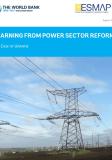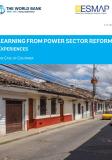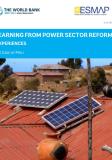Publications
Deep reforms of the Philippine power sector began in 2001, aiming at competitive wholesale and retail markets. This case study analyzes the Philippine experience with wholesale electricity markets at the generation level, including design, implementation, and outcomes. The spot market began operation in 2006, amidst adequate generation capacity albeit highly concentrated among few players. The reforms have successfully introduced market-driven forces to system operation and spot price signals for investments. Investment in new generation has recently been commissioned; generation concentration has plunged since the market’s inception (mainly due to privatization of generation assets); and generation supply has been generally secure (barring natural disasters). However, serious conflicts due to market power abuse occurred in the past; the market remains concentrated in four major players; and new competitors have slowly entered through the opaque and largely regulated market of bilateral contracts. Moreover, following aggressive capacity additions, baseload coal generation soared over the past decade, reaching 50 percent of total output in 2017, thus raising concerns about environmental sustainability, the optimal capacity mix (due to lack of investments in flexible mid-merit and peaking power plants), and long-term supply security of the Philippine power sector (since coal is imported). The case of the Philippines' power market highlights the importance of adequate ownership structure supportive of competition, the need of effective monitoring and oversight, especially during initial phases of the market, and the benefits and challenges that open and competitive wholesale markets can provide over time, especially in interaction with vertical integration (whether through cross-ownership or through bilateral contracts).
Power Markets | Evaluates developing country experiences with design and operation of wholesale power markets and identifies the necessary preconditions for markets to function. To learn more, download the literature review, and look out for forthcoming power market cases for Colombia, India, Peru, and Philippines.
Rudnick, Hugh; Velasquez, Constantin. 2019. Learning from Developing Country Power Market Experiences : The Case of the Philippines (English). Policy Research working paper; no. WPS 8721; Rethinking Power Sector Reform. Washington, D.C. : World Bank Group. http://documents.worldbank.org/curated/en/428331548771494859/Learning-from-Developing-Country-Power-Market-Experiences-The-Case-of-the-Philippines


